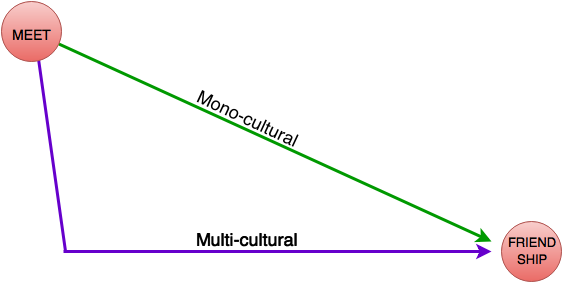
Of all the topics I cover in my seminars, the subject of relationships seems to elicit the most interest and response. At our core, I think we MKs and TCKs know that we don’t function like others in this area, yet we can’t quite put our finger on what it is that makes us so different. (MK = Missionaries’ Kid. TCK = Third Culture Kid.)

I think our methods for developing relationships are most acutely challenged during our initial reentry into our Passport Culture—a world that is supposed to be familiar and comfortable to us, but is often confusing on a human-to-human level. If we’ve spent our entire lives around other TCKs, we assume that everyone functions the way we do…or should! But they don’t.
As so many MKs and TCKs are currently beginning educational careers in mono-cultural settings (where social interactions are founded on the host culture’s norms), it might be useful to explore why we do things differently and how we can adapt in order to find true connection with our mono-cultural peers.
Introducing The Time/Depth Dilemma: whereas MKs and TCKs generally require depth in forming relationships, mono-culturals require time to form meaningful connections. On paper, it looks like this:

Do you see how quickly and fearlessly the MK/TCK dives deep? To the mono-cultural person who craves time to slowly move from depth to depth, the MK appears way too intense. To the TCK who values speedy self-revelation, the mono-cultural’s emphasis on time feels shallow and pointless. As a result, we (stupidly) reach the conclusion that an entire people-group is relationally flimsy and we write them off with an arrogant generalization.
[Clarification: in no way do I use “mono-cultural” as a negative label. People who have never left their country of origin are not inferior to those who have. Their lives are just as significant. Their experiences are just as valid. Their histories are just as rich and worthy. Their contribution to our lives and to the world are just as notable. “Multi-cultural” and “mono-cultural” merely serve to distinguish people groups with different experiential backgrounds.]
Why do TCKs do things so differently? There are several reasons, really. The greatest of them is the awareness that time is limited. We’ve lived so long in a world saturated with both expected and unexpected goodbyes that we enter each relationship anticipating that it could end at the drop of a hat—when circumstances, mission mandates, finances or the inherent transience of the international community rip us away from those we’ve loved.
We function as if there is no time—because so often, there isn’t! When we meet someone new, it’s as if an invisible timer has started a countdown. Quickly! Figure out who this person really is. Tell her about your greatest joys and sorrows and see if she knows what to do with them. Ask him about his faith and emotions, and see if he’s willing to be vulnerable. Throw every “like” and “dislike” at the person you’ve just met and see where your points of interest intersect. Then decide (just as quickly) whether this person is capable of the depth you crave and worth the inevitable pain that will come when your proximity is suddenly ended.

It’s a lightning-fast vetting process that serves two important purposes: eliminating the tedious, long-winded “getting to know you” stage and diving headfirst into the kind of meaningful connection that feeds your soul.
MKs and TCKs can cram a lifetime of friendship into just a few weeks, because we’re so focused on making the most of what we have while we still have it.
Mono-culturals function completely differently. They observe a steady descent through well-defined relationship levels—not because they’re shallow, but because it’s the progression that makes their culture comfortable. Each level can take days or months, depending on personalities. They are:
- Cliché: Exchanging pleasantries, superficial topics, “How are you?” gets standard answers.
- Reporting: Conversing about sports, TV, factual information.
- Judgment: Sharing some more personal things like opinions and beliefs.
- Emotional: Revealing how we feel about things, stories that have impacted us.
- Disclosure: Allowing transparency and complete vulnerability based on trust. (♦)

As MKs, we might look at the progression of mono-cultural relationships and roll our eyes. We dislike the expectation that we engage in small talk for days, weeks or months before progressing to a deeper level of communication. It feels absurd and trivial to us. But even when we do try to play along, we often find that our version of “small talk” can leave our friends bemused. Because small talk, to us, includes discussing personal, intimate things. It’s not a big deal—it’s how we roll! But we’re not in our own world anymore, where sameness allows for shortcuts. We’re in somebody else’s world. And respecting a culture means respecting its relational methods.
Look back at the Time/Depth diagram. Do you see how both relational methods eventually end in friendship? That’s the bottom line. As we enter into a mono-cultural setting that has a well-established progression for making friends, it falls on us to be flexible. This culture was not designed for our comfort—it was designed for the comfort of those who belong in it (†). It would serve us well to apply all the cross-cultural skills and flexibility we’ve learned in our international lives to this culture too.
To be honest, there are some downsides to the TCK way of forming relationships. The first is that we can be far too quick to dismiss someone we’ve just met. In a mono-cultural setting, where time is essential, we might be judging people to be “unworthy” of our attention and affection before we’ve given them the time to go through the requisite levels and reach authentic intimacy.
In my own life, how many people have I dismissed because they didn’t dive deep enough fast enough—people who might have become kindred spirits if I’d just been patient enough to see where it led?

We also risk creating misunderstandings if we enter a mono-cultural setting without respecting its relationship-building methods:
- Scaring others off with the intensity of our self-revelation. If they’re not used to that kind of thing, it could freak them out enough to prohibit further connection.
- Discovering that members of the opposite sex have taken our willingness to be vulnerable as a romantic overture. I’ve interviewed dozens of MKs who found out too late that a mono-cultural “friend” thought they were engaged in a much deeper girlfriend/boyfriend relationship! That’s what happens when we skip cultural levels of communication.
- Finding that we’ve attracted the needy, not the healthy. In mono-cultural settings, the needy are generally those who expose themselves too readily. They’ll recognize themselves in us and latch on. Disentangling ourselves from them down the road might be a messy proposition.
- Sharing our “deepest, darkest” with untrustworthy people to whom we haven’t given the time to prove their character. It’s important that we allow enough weeks and months to pass to be sure of the person to whom we’re revealing ourselves .
So what is my advice to those of you who are entering a new world in which friendships are predicated on mono-cultural principles?

First, use your vast cross-cultural skills! If you were dropped into a primitive tribe in the jungles of South America, you’d find a way to learn about the people, to understand and emulate their approach to friendship. You wouldn’t demand that they become like you, yet so often, that’s our expectation of our passport culture. Be tolerant, be adaptive, be kind. Consider this a cross-cultural experience.
Set healthy boundaries. Be aware that over-sharing too soon can get you into trouble, so be honest and open, but respect this culture’s need for gradual intimacy. You don’t want to scare away a potential friend.
Commit to the long-term. Though the small talk might feel tedious and the process too drawn-out, you won’t really know how these friends could enrich your life (and you theirs) until you’ve given those relational stages the time to play out. As you can see from the Time/Depth graph, both methods of relationship-making end in friendship. And though you may not have your “internationality” in common with mono-cultural friends, I can assure you that we Third Cultured People have much to learn from those who have never owned a passport—like belonging, loyalty, family bonds, cultural identification and long-lasting relationships…
So be patient. Expect good things. Engage in the process.
[Bonus Video]
(To share the video, copy and past this link: https://youtu.be/PYVnLC9m9JQ )
Please join the conversation!
- Contribute your thoughts in the comments section below
- Use the social media links to Like and Share this article
- Many of these articles are now available in podcast form. Simply search for “Pondering Purple” on your usual pod platforms, or click this link to be taken to its host page.
- To subscribe to this blog, email michelesblog@gmail.com and write “subscribe” in the subject line
- Pick up Of Stillness and Storm (my novel about a missionary calling gone awry) on Amazon
Resources: Third Culture Kids (Pollock/Van Reken), Barbabas, Heidi Tunberg (♦), Libby Stephens (†).


Terry Woodward, MS, LPC, NCC
Wonderful! I think it is really difficult for TCKs who are soooo comfortable diving into relationships to hold back, but the importance of that cannot be overstated. I agree fully that by applying their relational patterns to the cultural norms in the States or other places of similar culture, they will often encounter the hardships you mentioned. I have especially seen this with kids in regards to friendships with members of the opposite sex (the TCK thinks they are just friends and the mono-cultural kid thinks it is a budding romance.)…. Great article/post Michele!
Rebekka J.
Wisely summarized! Relate to “There is no time”, attracting the needy or directness being misunderstood.
Nathan V.
Unbelievable! I’ve concluded that so many of these things are just my personality…yet the way you break it down makes me realize how much of it is a result of my upbringing. “There are others like me!” Thanks!
Ray W.
People say they like their church small groups because they are safe places to open up and be vulnerable. I find them to be very dangerous places for that (unless it’s an MK/TCK group!). Thanks for very helpful insight into that. It explains a lot and is true to my experience. Not much awareness or help for TCK’s my college years (it was just another boarding school in USA instead of Africa). The term didn’t exist then, and Passport Country or Culture only recently, another helpful term.
Dave Lewis
This really holds true in our experience as well. An important topic for debriefing.
shary
This is very good at helping TCK to understand when they come to white US. But I am sure that in other countries it may be a very different culture, maybe even one more like the TCK culture. The fact is the US culture is not the only culture. Most white people in US can’t even relate to their fellow citizens of a different race. Just because I adapted to this culture doesn’t mean it is good. After having friends here for 30 and 40 years I still find them afraid of deep relationships. It isn’t just time they are also afraid to expose who they really are. I still let them see the real me and once and awhile when they run into heart breaking situations they come to me. Yes it is good to know this but it can also lead TCK to believe they are defective because they do not like long shallow relationships. No culture is wrong just different.
Zach
This is spot on. Thanks for the encouragement.
Angie
the funny thing is, my problem is getting too close too fast and then disconnecting.. there’s a mental block that just makes me put people at a distance after we’ve gotten close. i’m scared that they will leave me eventually so I cut the cord myself just to make it hurt less.
not sure if anyone else has experienced this
Moe Gyo
I may be an outlier on this.As a military brat (MB), I went to 11 schools in 12 years of school. Knowing either I or the other person was going to leave sooner than later, I formed shallow, not quick deep, relationships with them for emotional protection. In all of those years, I only met one person later who I had knew before. Also, class reunions have not been meaningful as I only attended the 12th grade at the last relocation.
[BLOCKED BY STBV] Ten Tips for Transitioning TCKs - One Challenge
[…] influences our interactions, many of our frustrations with transition will lessen. Just click THIS LINK to be taken to the article devoted entirely to this difference between TCKs and […]